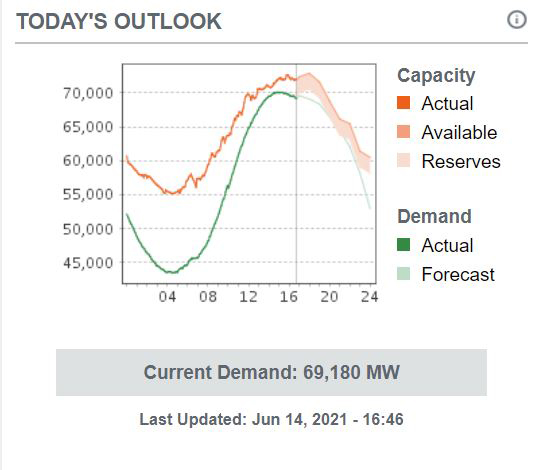Faced with an above-normal number of forced thermal generation outages and possible record demand, ERCOT called for conservation measures on Monday that will last through the end of the week.
The Texas gird operator said that as of 2:30 p.m. CT, it had 12.2 GW of forced outages. Thermal generation accounted for 9.1 GW of the outages, three times more than normal, staff said, because of either mechanical failures or repairs.
ERCOT was trending on Twitter on Monday as Texans, still jittery from the dayslong blackouts following February’s winter storm, retweeted the grid operator’s initial conservation call more than 6,000 times.

“We completely share those concerns,” Warren Lasher, senior director of system planning, said during a media call. “We are deeply concerned with the issues about all these plants being offline. We will be doing a thorough investigation to assess the implications for the grid.”
Renewable energy’s output was also lower than normally seen during peak periods, Lasher said. Solar resources were providing 5.4 GW of energy, and wind resources were supplying 3.4 GW at 2:30.
Luminant confirmed that one of the two 1.2-GW units at its Comanche Peak generating station was offline. The unit shut down automatically when a fire broke out at the main transformer. A spokesperson said plant personnel are working diligently to repair the transformer.
With a reserve margin of 15.7%, nearly double that in recent years, ERCOT had assured the public this spring that it had more than adequate capacity to meet expected summer demand. (See ERCOT Resource Adequacy Hard Sell After Winter Storm.)
Load leveled off after reaching 69.9 GW during the interval ending at 4 p.m. following the conservation call. That broke the June record of 69.1 GW set in 2018.

Staff had forecasted a record demand of 70.1 GW but warned of a 73-GW peak before the conservation call. Temperatures reached triple digits in the Houston area and were in the high 90s elsewhere.
ERCOT said it had been told by generation owners that the number of outages would decrease during the week. Lasher still had some diplomatic, yet tough language for them, saying he found the number of units on forced outages to be “very concerning.”
“We’re not clear why we’re seeing so many unplanned outages at this time. We’ll be looking very hard at which units are offline and why they are offline and when they’ll be back online,” Lasher said. “It’s the responsibility of the generation owners to make sure their plants are available during the peak hours when customer demand is very high during the summer months. My concern is the resource owners need to make sure their plants are available during the summer months.”




